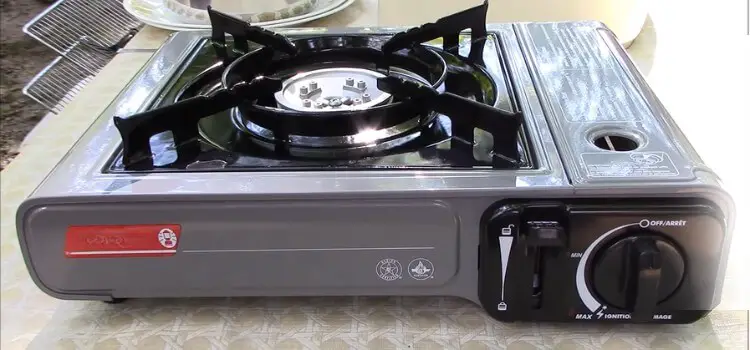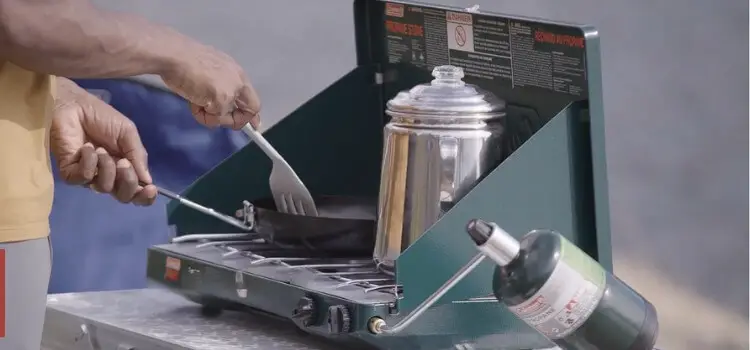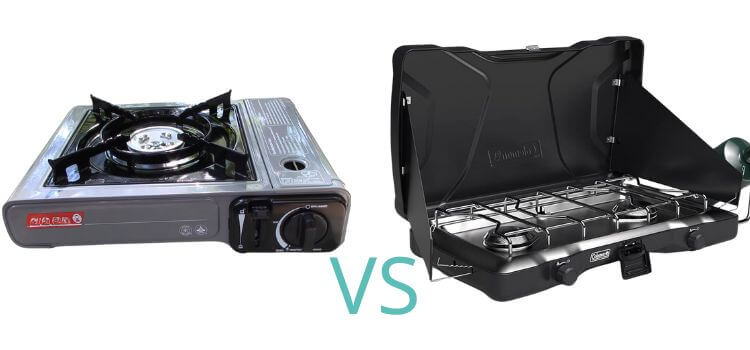Choosing the right stove for outdoor cooking and camping is very important. The right stove can make your cooking experience easy and enjoyable, while the wrong one can lead to frustration and inconvenience.
Two of the most popular types of stoves are butane and propane stoves. Each type has its own benefits and drawbacks, and knowing these can help you decide which one is best for your needs.
In this article, we will look at butane and propane stoves, comparing their features, advantages, and disadvantages to help you make the best choice for your outdoor adventures.
What is a Butane Stove?
A butane stove is a portable cooking device that uses butane gas as its fuel source. Butane, a type of hydrocarbon, is stored in small, pressurized canisters that are easily attached to the stove. When ignited, the butane gas mixes with air to produce a steady flame, which is used for cooking. These stoves are designed to be compact and lightweight, making them ideal for outdoor activities like camping, hiking, and picnics.

Common Uses and Scenarios Where Butane Stoves Excel
Butane stoves are particularly popular among campers and outdoor enthusiasts due to their portability and ease of use. They excel in scenarios where convenience and quick setup are essential. Here are some common uses and scenarios where butane stoves are preferred:
- Camping Trips: Butane stoves are easy to carry and set up, making them perfect for camping trips. Their compact size fits well in backpacks and camping gear.
- Picnics: For picnics in parks or outdoor settings, butane stoves offer a convenient way to cook meals on the spot.
- Backpacking: Lightweight and compact, butane stoves are favored by backpackers who need to minimize the weight of their gear.
- Emergency Situations: In case of power outages or emergencies, butane stoves provide a reliable cooking solution.
Key Features of Butane Stoves
Butane stoves come with a variety of features that make them a popular choice for outdoor cooking. Here are some key features:
- Portability: Butane stoves are designed to be lightweight and compact, making them easy to transport and store.
- Ease of Use: These stoves typically have a simple setup process. Most models feature a straightforward canister attachment mechanism and an ignition system that allows for quick and easy lighting.
- Adjustable Flame Control: Butane stoves usually offer adjustable flame settings, allowing users to control the heat output for precise cooking.
- Clean Burning: Butane burns cleanly with minimal soot and smoke, which is beneficial for both the user and the environment.
- Safety Features: Many butane stoves come equipped with safety features such as automatic shut-off valves that activate if the flame goes out or if the stove overheats.
- Compact Design: The compact design of butane stoves means they take up minimal space in your gear, which is ideal for camping and outdoor activities.
What is a Propane Stove?
A propane stove is a portable cooking device that uses propane gas as its fuel source. Propane is stored in pressurized tanks or canisters that are attached to the stove. When ignited, the propane gas mixes with air to create a steady flame, which is used for cooking. These stoves are known for their strong performance and reliability, making them a popular choice for various outdoor activities.

Common Uses and Scenarios Where Propane Stoves Excel
Propane stoves are highly favored by outdoor enthusiasts and campers due to their robust performance and versatility. Here are some common uses and scenarios where propane stoves shine:
- Camping Trips: Propane stoves are reliable and powerful, making them ideal for cooking full meals during camping trips.
- RV Camping: For those traveling in recreational vehicles (RVs), propane stoves are a convenient option because they can be connected to larger propane tanks.
- Tailgating: Propane stoves are great for tailgating events, providing a dependable cooking source for grilling and meal preparation.
- Outdoor Gatherings: For outdoor parties and picnics, propane stoves offer a quick and efficient way to cook food for large groups.
- Emergency Situations: In emergencies, such as power outages, propane stoves provide a reliable way to cook and boil water.
Key Features of Propane Stoves
Propane stoves come with several features that make them a popular choice for outdoor cooking. Here are some key features:
- Strong Performance: Propane stoves provide a high heat output, making them suitable for cooking a variety of meals quickly and efficiently.
- Versatility: These stoves can be used with different sizes of propane tanks, from small canisters to large tanks, giving users flexibility in fuel choice.
- Ease of Use: Propane stoves are generally easy to set up and use. Most models feature a simple ignition system, often a push-button start, and easy fuel connection.
- Adjustable Flame Control: Propane stoves usually offer adjustable flame settings, allowing users to control the heat level for precise cooking.
- Durability: Propane stoves are often built to withstand rough outdoor conditions, making them durable and long-lasting.
- Wide Availability: Propane is widely available, making it easy to find and refill tanks or canisters almost anywhere.
- Safety Features: Many propane stoves come with safety features such as automatic shut-off valves that activate if the flame goes out or if the stove overheats.
Comparison: Butane Vs Propane Stoves

Fuel Availability and Cost
Availability of Butane and Propane
- Butane: Butane canisters are available in most camping and outdoor stores. They are also found in hardware stores and some supermarkets. However, butane may not be as widely available in remote areas.
- Propane: Propane is more widely available than butane. You can find propane canisters and tanks at gas stations, outdoor stores, and big-box retailers. Propane is often available in larger quantities, making it more convenient for extended trips.
Cost Comparison of the Fuels
- Butane: Butane canisters are generally more expensive per unit than propane. The cost can add up, especially for frequent campers or long trips.
- Propane: Propane is usually cheaper per unit compared to butane. Large propane tanks offer more fuel for a lower cost, making it a more economical choice for extensive use.
Performance in Different Conditions
Performance in Cold Weather
- Butane: Butane stoves struggle in cold weather, especially below freezing temperatures. The gas does not vaporize well in the cold, leading to weak or non-existent flames.
- Propane: Propane performs better in cold weather. It vaporizes efficiently even at low temperatures, making it a reliable choice for winter camping.
Performance at High Altitudes
- Butane: Butane stoves can be less effective at high altitudes due to lower air pressure, which affects the gas flow and combustion process.
- Propane: Propane stoves generally perform better at high altitudes compared to butane. The gas flow and combustion are more consistent, ensuring better performance.
Ease of Use
Setup and Ignition Process
- Butane: Butane stoves are typically very easy to set up. The canisters are lightweight and attach quickly to the stove. Ignition is often simple, with many models featuring a built-in piezoelectric igniter.
- Propane: Propane stoves also offer straightforward setup, but the canisters or tanks can be heavier and bulkier. Ignition is usually reliable, with many stoves featuring push-button starts.
Portability and Weight Considerations
- Butane: Butane stoves are lighter and more compact, making them easier to carry for backpacking and lightweight camping trips.
- Propane: Propane stoves tend to be bulkier and heavier, especially when used with larger tanks. This makes them less ideal for backpacking but suitable for car camping and RV trips.
Safety Considerations
Safety Features of Butane Stoves
- Butane: Many butane stoves come with built-in safety features such as automatic shut-off valves that activate if the flame goes out or if the stove overheats. Butane canisters are designed to be safely attached and detached from the stove.
- Propane: Propane stoves also include safety features like automatic shut-off valves and pressure regulators. The connection between the stove and the propane tank is usually secure and robust, reducing the risk of leaks.
Environmental Impact
Environmental Footprint of Butane
- Butane: Butane has a relatively low environmental impact when burned, producing fewer greenhouse gases compared to some other fuels. However, the disposable canisters can contribute to environmental waste if not recycled properly.
- Propane: Propane is a clean-burning fuel, producing fewer emissions compared to gasoline and diesel. Refillable propane tanks are more environmentally friendly than disposable butane canisters, as they reduce waste.
Pros and Cons of Butane vs Propane Stoves
Butane Stoves
Pros
Cons
Propane Stoves
Pros
Cons
User Recommendations
Recommendations for Casual Campers and Hikers
For casual campers and hikers who prioritize lightweight and easy-to-use equipment, butane stoves are the best choice. These stoves are perfect for short trips where convenience and portability are key.
Recommendations for Frequent and Extreme Weather Campers
Frequent campers and those who camp in extreme weather conditions need a stove that is reliable, durable, and performs well under various conditions. Propane stoves are often better suited for these requirements.
Final Thoughts on Choosing Between Butane and Propane Stoves
The choice between butane and propane stoves depends largely on your specific needs and the conditions in which you plan to use them. If you prioritize portability and ease of use for short trips in mild weather, a butane stove may be your best bet. Conversely, if you often camp in colder climates or need a stove that can handle more extensive cooking tasks, a propane stove would be a more reliable option.
FAQs
Which is better for cold weather, butane or propane stoves?
Propane stoves are better suited for cold weather as propane vaporizes efficiently even in low temperatures, ensuring a steady and reliable flame.
Are butane stoves safe to use indoors?
It is generally not recommended to use butane stoves indoors due to the risk of carbon monoxide buildup and potential fire hazards. Always ensure proper ventilation if used in enclosed spaces.
How long does a butane canister last?
The duration of a butane canister depends on the stove’s usage and the size of the canister. On average, a standard 8-ounce canister lasts about 1.5 to 2 hours on high heat.
Can I use a propane stove at high altitudes?
Yes, propane stoves perform well at high altitudes. The gas flow and combustion remain consistent, making them a reliable choice for high-altitude cooking.
Which is more cost-effective, butane or propane?
Propane is generally more cost-effective in the long run, especially for frequent use. Propane fuel is typically cheaper per unit and available in larger, refillable tanks.
Leave a Reply